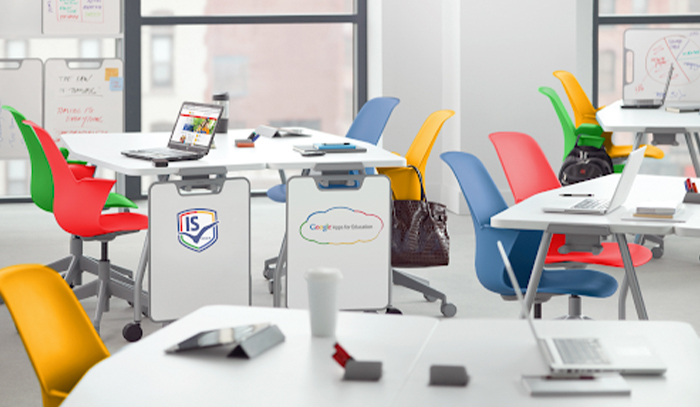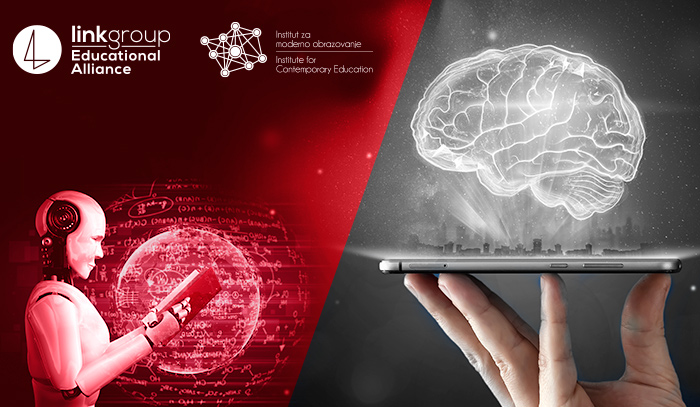LINK Edu Alliance representatives take part in School Innovation Forum on artificial intelligence (AI)
Technology is pervading our daily lives more rapidly and more radically. No matter how much it improves the quality of our lives, it can, at times, become a burden. This is why the challenges and opportunities of the technological revolution have lately often been in the focus of experts and governments.
The integration of AI in educational processes and systems would significantly affect education in general, which is why it is highly important to create a framework for its rational use in teaching, learning, and in the management of institutes and schools. Hence, an ecological view on artificial intelligence was the central theme at the recently held School Innovation Forum.
The event, held under the patronage of the European Parliament, is organized by the European Schoolnet (EUN), which has become one of the key organizations for the transformation of education processes and the use of IT in education.
The discussions, round tables, and workshops at the Forum were attended by the most influential innovators in education – from representatives of ministries of education and non-government organizations, to experts, teachers and other relevant stakeholders. Among them were representatives of the Institute for Contemporary Education on behalf of the LINK Edu Alliance.
The challenges and opportunities of AI in education
The key EUN stakeholders used the Forum’s environment to exchange ideas on how emerging technologies can be used in education, both in policy making and pedagogical practice. Representatives of ministries of Education, national and international agencies, the private sector, and research experts, scientists and analysts in education, discussed the challenges and opportunities that AI brings to school innovation, teaching and learning.
The latest advancements in educational technology have raised questions on how to constructively use AI in education and incorporate it in teaching and learning processes and grading systems.
Governments are now looking for opportunities to mitigate the impact of AI on the management and governance of institutes and schools. At the same time, the European Commission, UNESCO and OECD, as well as the member-states are investing in research and innovation for AI, while also providing guidance on the implementation of policies around the use of AI in education.
What are the challenges, ethical considerations and risks of implementing AI in schools?
In this year’s Forum, EUN initiated a dialogue on AI, exploring an ecological view on its use in education.
The first day was open to the public and featured interventions by the policy makers such as David Maria Sassoli, President of the European Parliament, Sabine Verheyen, Chair of the Committee on Culture and Education, European Parliament, as well as state officials in charge of educational affairs.
Looking at AI in education through a critical lens, Dr. Wayne Holmes, UNESCO Consultant for AI and Education, highlighted that the ultimate objective of the new policies is to ensure that educational AI technology is used to empower teachers rather than to try to replace them. In addition, he believes that it is necessary to develop appropriate capacity-building programs for decision makers, headmasters and teachers to work alongside AI systems.
Following the keynote address, the panelists gathered at the roundtable to discuss the status of AI in education in Europe and beyond. They concluded that the aim of interventions is to challenge assumptions related to AI and to focus on opportunities, but even more importantly, on challenges, ethical considerations and risks.
Schools of the future already exist at the LINK Edu Alliance
Workshops organized during Days 2 and 3 were closed to the public and open only to the EUN stakeholders.
Tackling various issues, the workshop participants explored the use of AI in teaching, learning, assessment and professional development. The Academic Director of the Institute for Contemporary Education, Dr. Svetlana Belić Malinić, as an international educational expert, contributed to the knowledge generation and supported the exchange of ideas in two workshops.
On Day 2, Svetlana contributed to the group discussing student assessment in the era of AI. The examples of how the governments of the Netherlands, Denmark and Estonia integrated AI in state exams, adaptive online testing and student learning personalization was food for thought and further exploration.
On Day 3, Svetlana shared insights on emerging edtech and the concept of the school of the future. The ambassadors of the Future Classroom Lab (FCL) presented the concept which challenged visitors to rethink the role of pedagogy, technology and design in their classrooms.
It is interesting to highlight that LINKgroup’s Intelligent Classroom (iClass) has a very similar concept, conceived in 2015, when the future of schools was never meant to arrive at an accelerated pace. It features technological delights such as virtual reality devices, 3D scanner and printer, robots and many more.

Guideposts in the digital transformation of education
Driven by the mission to support education stakeholders in Europe in the transformation of education processes for 21st century digitalized societies, EUN’s School Innovation Forum has set great expectations.
Having learnt more about identifying and testing promising innovative practices, sharing evidence about their impact and supporting the mainstreaming of teaching and learning practices, the stakeholders opened new perspectives for a new age in which the use of AI is yet to evolve and reimagine.
Institute for Contemporary Education – A Beacon of 21st-century Education
Following the School Innovation Forum conclusions, Svetlana highlighted the new paths for the Institute for Contemporary Education:
“Our Institute is indeed future-ready and open to explorations on innovative educational solutions, which would decidedly change the course of learning and teaching in years to come. It appreciates the potential of new technology to scale up pedagogical instruction, facilitate student learning personalization and foster digital literacy at many levels.”
The LINK Edu Alliance strives to empower teachers and educational leaders to use emerging technologies in their pedagogical practices, harness the potential of AI in assessment and create a culture in which learning is a true value.



Leave a comment